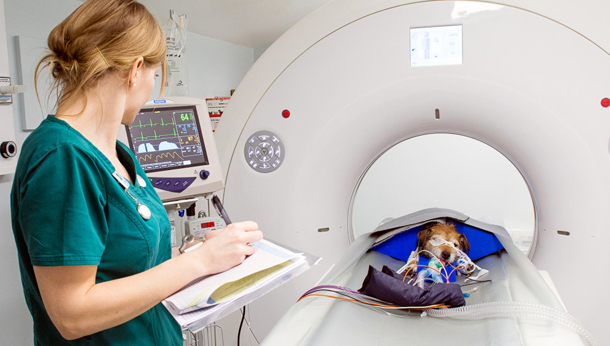
A day in the life of a referral veterinary nurse
Specialist hospitals like Southern Counties Veterinary Specialists require a large team of registered veterinary nurses and animal nursing assistants to support the specialist clinicians and veterinary interns in the treatment and care of your pets.
Our nurses will either work in the clinical areas whereby they assist with preparing patients for their diagnostic procedures and surgery or within the wards rooms where they will be caring for all patients in the hours or days after they have undergone their diagnostic procedures and or surgeries.
Here at Southern Counties Veterinary Specialists, qualified veterinary nurses will work in the following roles:
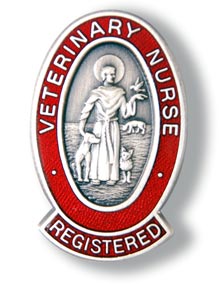
- Preparation room nurses
- Nurses on rotation (work in every area on a weekly basis)
- Surgical nurses
- Medical nurses
- Cardiology nurses
- Neurology nurses
- Wards nurse
- Night wards nurses
Animal nursing assistants; will assist these nurses within the clinical preparation, surgery rooms/theatres and within wards rooms.
Meet Jackie, a member of our rotation nursing team
How long had you worked in general practice before you made the move to referral nursing?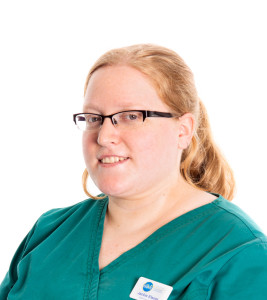
I had been qualified for 6 years before moving to SCVS. Prior to moving here I worked as a locum and then at a first opinion hospital.
What made you decide to become a referral nurse?
I chose to try referral nursing 2 years ago, because I felt I wasn’t working to my full potential in first opinion practice and had begun to feel that there was no further room for progression within my job. I wanted to work somewhere where I could be more hands on with my nursing and deal with more complex cases, in order to further my practical skills.
What was it that motivated you to specialise?
I haven’t specialised in one single area yet because I enjoy the variety of working on the rota in each of the different departments. I can spend one week in surgery implementing my anaesthesia skills and the next in wards where I can be more hands on with inpatient care.
Describe your typical day at work?
My typical day at work is incredibly variable. I don’t work a typical 8-5 job. One day I might spend all day in theatre, another I might be in MRI, wards or imaging. Because of this I experience an extremely diverse range of patients from neurological emergencies to broken bones right down to patients coming in for routine recheck radiographs.
Do you have a particular interest within any department which you rotate in?
Because I work in most disciplines its hard to choose a particular interest. If I had to choose I would say that I enjoy imaging the most as I enjoy taking x-rays, there’s something satisfying about taking a good quality x-ray. I also enjoy being in theatre, whether it’s a routine TPLO or something a little more complicated like a ventral slot. I appreciate the continuity that I get in the neurology department that I can stay with a case from its initial assessment, through its MRI and even into surgery.
And, I enjoy hands on inpatient care while working in wards, my favourites are the ECC patients in the ICU that require more involved nursing such as those with urinary catheters, chest drains, jugular catheters and feeding tubes for example.
Are there certain qualities you possess which enable you to work well within your discipline?
I’d say the best quality to posses to be a rota nurse is to be adaptable. It can be challenging moving from one department to the next each week, using different skills and working with a different team in each department. But I enjoy the variation and feel being adaptable to all situations makes this possible for me.
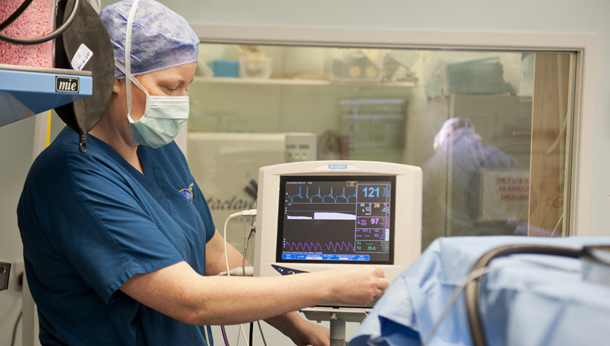
Meet Clare, our head of Surgery nurse
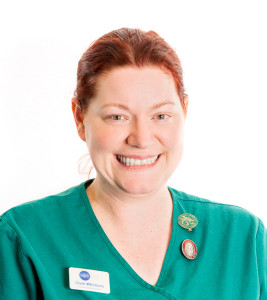
How long had you worked in general practice before you made the move to referral nursing?
I worked in general practice for 7 years before I locum nursed with an orthopaedic surgeon. From there I started working with specialised surgeons.
What made you decide to become a referral nurse?
It really came about by accident whilst I was a locum nurse in a mixed first opinion and specialist orthopaedic practice, but I always enjoyed the more challenging aspects of nursing.
What was it that motivated you to specialise in surgery nursing?
I have always enjoyed surgery and once the opportunity came up I specialised.
Describe your typical day working in surgery?
I am the head theatre nurse so I am in charge of the day to day running of our three theatres. I order all the surgical implants and ensure that all the instruments are prepared for the surgeries throughout the day. I also perform anaesthetics and imaging.
Do you have a particular interest within surgery nursing?
I really enjoy orthopaedic and neuro surgery.
Are there certain qualities you possess which enable you to work well within your discipline?
I think that I am an organised person and this helps me run the theatres and the surgeons!
Finally is there any advice you’d like to give to any veterinary nurses out there who might be considering the move to referral practice?
If you are a nurse that loves to get stuck into those real in depth nursing jobs, being right at the front line of patient care, then I think that referral work is for you. It is a really good opportunity to improve your knowledge and gain confidence in your nursing abilities.
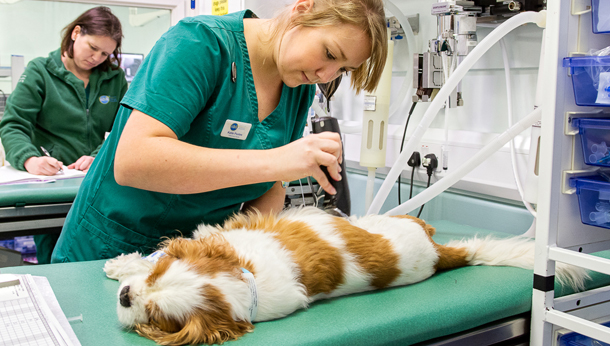
Meet Katie, a medicine nurse
How long had you worked in general practice before you made the move to referral nursing?
I worked four years as a student and one year qualified.
What made you decide to become a referral nurse?
Towards the end of my degree, I knew referral nursing was something I wanted to try. The chance to improve and increase upon my knowledge is something I wanted to keep on top of and where better to do that then at a referral centre, surrounded by specialists and advanced nurses. I enjoyed the prospect of being able to work on interesting cases and learn new skills.
What was it that motivated you to specialise?
Internal medicine has always been an interest of mine. I enjoy the cases we see and learning more about the diagnostics and treatment required.
Describe your typical day at work?
I start my shift at 09:00am, so morning rounds have been completed and plans are already in place for our inpatients. I’ll get involved with inpatient care for the morning, which might include blood sampling, administering medications or perhaps oesophagostomy tube management and enteral feeding. I will then be involved in seeing new referrals for their investigations; these might include advanced imaging (CT, ultrasound). Patients may require placement of enteral feeding tubes or central lines (jugular catheters or PIC lines) so I would prepare the relevant equipment and assist the clinicians with this. I would then ensure any requests by the clinicians would be passed onto members of the ward team, I would also be involved in implementing nursing care plans. Some days we might even sneak a blood transfusion or two in as well. However, no day in the Medicine department is the same, which makes it that little bit more exciting.
Do you have a particular interest within medicine?
I really enjoy endocrinology but recently I have gained an interest in immune mediated diseases.
Are there certain qualities you possess which enable you to work well within your discipline?
A willingness to learn, there is so much to learn (and I still am!) but once my knowledge has built up, I look forward more to engaging in discussions about cases. It will also be helpful in improving my ability to nurse medical cases. Being able to work as a team, on a busy day in medicine, cases can start to pile up, getting on with your team members and being able to work well together is a must. Making sure that the day runs smoothly so all cases are completed and also so we can all finish on time (for a well deserved rest). Finally and most importantly an interest in internal medicine, otherwise you might become bored.
Would you like to give any advice or encouragement to any veterinary nurses out there who might be considering the move to referral practice?
Just do it! Referral work is definitely a big change from first opinion, It can seem a little daunting at first, but the cases are interesting and you will learn so much enabling you to enhance on your practical skills. It is better to go ahead and give it a try, then a few years down the line thinking “I should have done that”.
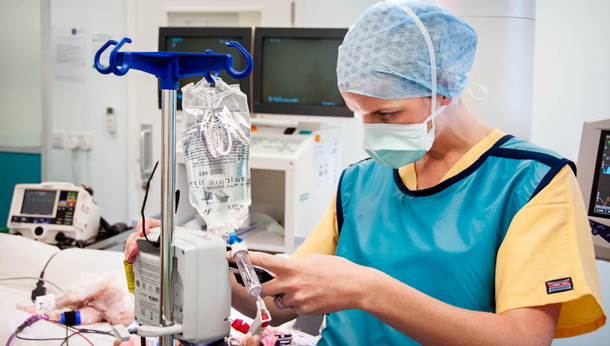
Meet Leah, who is a staff nurse in the cardiology department
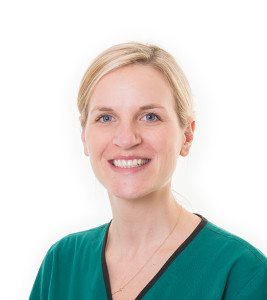
How long had you worked in general practice before you made the move to referral nursing?
4 years
What made you decide to become a referral nurse?
I felt that I needed to expand my skill set and move on to a more challenging role. It was like a move up through the ranks, I felt stuck in a position where I had achieved all that I could in my current position and wanted to move up.
What was it that motivated you to specialise?
I really enjoyed Cardiology and found the Heart fascinating. I wanted to learn more about the organ and the diseases that affect it. I also discovered that a different style of nursing was required to nurse cardiac patients, and this required further training. This enabled me to nurse the patients to the best of my ability and make their experience with us as pleasant as it could be. Also with the intervention procedures being more sort after, this also required extra knowledge and understanding of cardiology.
Describe your typical day at work?
We run cardiology primarily as an out patient clinic. We see new referrals and recheck patients as scheduled throughout the day. This can be, and is often interrupted by emergency appointments with dogs and cats being referred in crisis in need of specialist care.
Most of the time we know what we are going to see and as the patients require regular rechecks and we get to have a great relationship with our patients and there owners. But as always in veterinary medicine, it’s unpredictable and can change at the drop of a hat. This makes for an interesting and diverse job role.
Do you have a particular interest within your discipline?
Cardiac intervention procedures, this is something that we have been doing at SCVS for the past few years and is becoming a frequent occurrence. We offer Pacemaker surgery, PDA surgery and Balloon Valvuloplasty. Not only is the surgery interesting, it poses a different anaesthesia protocol and management of the surgical supplies.
Are there certain qualities you possess which enable you to work well within your discipline?
A cardiac nurse is required to be very calm and gentle with their patients. Stress and cardiac disease don’t mix well and can be exacerbated massively by car journeys and trips to the clinic. I work really hard to try and make our patients feel secure and safe when they come to see us. Also trying to reassure the owners that their beloved pets are in safe hands is essential.
Is there any advice or encouragement you could give to any veterinary nurses out there who might be considering the move to referral practice?
Referral nursing I feel is the next step up. If you’re looking for diversity and a challenging job role then it’s for you. Its hard work and long hours, but is extremely rewarding and the results we have are evident in the life changing procedures we help our patients get through.
Meet Maisie, a neurology nurse
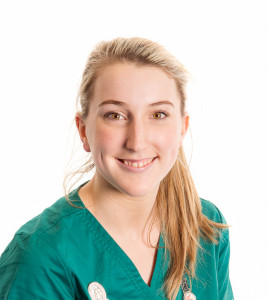
How long had you worked in general practice before you made the move to referral nursing?
I worked in general practice for 3 and a half years. I moved to SCVS a year after qualifying and becoming a registered veterinary nurse.
What made you decide to become a referral nurse?
As much as I loved working in general practice, I felt like working in a referral centre would offer me a new challenge and the opportunity to expand my nursing knowledge and progress in my nursing career. I wanted to learn from new people and experience a different working environment.
What was it that motivated you to specialise in neurology nursing?
I began at SCVS as a general nurse which meant I rotated through the departments each week which initially gave me a thorough incite to working in a referral centre. Neurology appealed to me because of the varied work load and interesting cases. I enjoy that you get to work alongside other departments (e.g. imaging, wards, and theatre) and that each day is different.
Would you tell us a bit about your typical day working in the neurology department?
My day starts by checking the neurology inpatients in the morning and helping the wards nurses with any medications/feeds/observations that are due. Then I go to morning rounds where the clinicians are bought up to date with the inpatients. Next, we see the new referrals and organise their investigations which often include a general anaesthetic and MRI scan. Plus any emergencies that appear throughout the day.
Do you have a particular interest within neurology nursing?
I have always had an interest in anaesthesia which is a big part of a neurology nurses role. All patients that require an MRI need to be under general anaesthetic to keep them still in order for the radiologists to obtain diagnostic quality images.
As well as the surgery and anaesthetic side of neurology, I also enjoy intensive care monitoring of the critical patients. Many neurology patients often spend weeks in hospital, so I enjoy spending time with the inpatients and nursing them back to health.
Are there certain qualities you possess which enable you to work well within your discipline?
Neurology is a very in depth subject so it is important that you have the desire to further your knowledge in the area. Also, it pays to be organised as it can be very busy at times! A positive mental attitude also helps!
And finally is there any advice or encouragement you could give to any veterinary nurses out there who might be considering the move to referral practice?
Do it! If you are worried about being out of your depth, as I was, there is plenty of support and training provided that will get you through your first few months.
Meet Charlotte, a wards night nurse
How long had you worked in general practice before you made the move to referral nursing?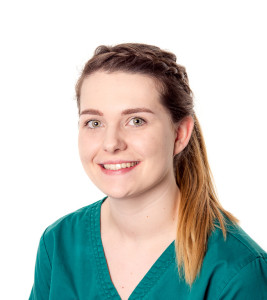
I was training in general practice for just over 3 years until I qualified as a veterinary nurse. Once qualified I promptly decided referral nursing was more suited to me.
What made you decide to become a referral nurse?
I decided to become a referral veterinary nurse because I wanted to further my knowledge of nursing, and referral seemed the most logical step. Since being at Southern Counties I have gained valuable knowledge in all areas of the practice. This has made me so much more confident and my nursing skills are much more advanced.
What was it that motivated you to specialise in ward nursing?
I was motivated to specialise because I found wards nursing so interesting. There is such a wide variety of cases that come through SCVS being a multidisciplinary referral hospital, which meant I was able to provide the specialised care needed for these patients.
Describe your typical “night” working in wards?
My typical night consists of all aspects of patient care. This includes things such as monitoring, medicating, feeding and walking patients. I also provide care to emergency and critical care patients in our ICU department. The beginning of the shift starts by receiving an in depth hand over of all the patients in the practice. The day wards staff will report how the patients have been during the day, if the current nursing plans have altered and what to expect of the patient overnight. We are required to TPR our patients at least every 12 hours, more if required and usually we aim to do this around 5.00am. After TPR’s at around 7.00am we hand back the patients to the day staff.
Do you have a particular interest within wards nursing?
The patients who I love nursing and find really interesting are patients who have undergone surgery, this mainly includes, neurological, orthopaedic and soft tissue patients. These patients are very rewarding to nurse. Due to their conditions various patients can remain in practice for long duration of time and this means strong bonds are formed between us (the nurses) and our patients.
Apart from being a “night owl” is there certain qualities you possess which enable you to work well as a night wards nurse?
A nurse working in wards must be good at communicating. In my opinion communication is key, this includes discussing patients with the veterinary surgeons and is essential for providing exceptional patient care.
Would you like to give any advice or encouragement to any veterinary nurses out there who might be considering the move to referral practice?
There are so many positives of referral nursing. The main benefit for me is having the opportunity to work with a friendly and knowledgeable team of specialists’ vets and nurses who are willing to help you gain familiarity within all areas of the practice. When I decided to try referral nursing I remember feeling worried that I may not be supported during this move into a new nursing job, however I was completely incorrect. The team gave me all the help and support I needed to become better at my job. I am so happy that I took the opportunity when I did, it was the best thing I did for my career and future.
Meet Charlie, a RVN who works in the physiotherapy department
How long had you worked in general practice before you made the move to referral nursing?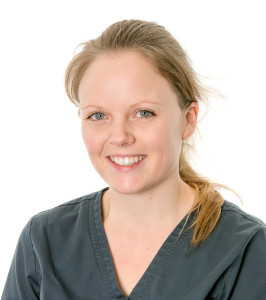
I worked in general practice from January 2008 when I started out as a volunteer and was then offered a placement to train to become a qualified veterinary nurse. After working in my training practice for 5 years, I then started as a locum nurse and continued to work in various different practices for 3 more years until I started referral nursing in January 2016.
What made you decide to become a referral nurse?
I decided to try my hand at referral nursing when I realised I wanted to understand how to look after patients with more critical conditions and therefore develop my nursing skills further. I also became very interested in physiotherapy and therefore wanted to be able to nurse neurological and orthopaedic patients.
What was it that motivated you to work a referral hospital and then choose to work within the physiotherapy department?
As my interest in physiotherapy grew, I started research and learn about more complex orthopaedic procedures carried out in referral practice and the more complicated neuro conditions that are referred from primary vets. I wanted to see these procedures and learn how to nurse these patients to the best of my ability. I also decided that I would like to do a certificate in physiotherapy and it was this that motivated me to specialise and start a new job as a physiotherapy nurse in a referral hospital.
Describe your typical day at work?
A normal day in the physio department would begin with the physio staff receiving a patient update from the orthopaedic and neuro-surgeons. During this, the physio staff are informed of the patients progress, any updates to medications and their treatment. The physiotherapists and the surgeons will finish with a discussion regarding what physiotherapy treatments will be carried out. As a physio assistant, I will then assist the physiotherapists with the inpatient care which depending on their individual requirements, can be 3-4 times throughout the day per patient. This would include massage, passive range of movement, cryotherapy, ultrasound and assisted standing and or walking.
Throughout the day, I would then assist the physiotherapists and hydro-therapists with consultations which may require me holding or supporting patients in the treadmill, comforting patients for their physiotherapy treatment and preparing any equipment that is required.
Do you have a particular interest within physiotherapy?
Overall, I thoroughly enjoy physiotherapy and the fact that we can make a difference to an animals comfort without the use of medication is what satisfies me the most. However, my main interest is the follow up rehabilitation on spinal patients. There is a huge sense of achievement in seeing the improvement of an animal that before having specialist treatment was unable to walk and being part of a team which then enables these animals to go home with their owner and continue their rehabilitation process and with our support, making it possible to eventually walk and have a good quality of life again, you just can’t beat that feeling.
Are there certain qualities you possess which enable you to work well within your discipline?
When nursing patients that require physiotherapy it can take a long period of time to see even the smallest of improvements and sometimes this can make owners feel very deflated and as though they and their pet are not making any progress. I am a positive and cheerful person; I think this is important as quiet often the owners and their pets need positivity and encouragement during their rehabilitation.
Is there any advice you could give to veterinary nurses out there who might be considering the move to referral practice?
You might think that you’re not good enough but that really is not the case and you should just go for it! Everyone will support you and help you to feel comfortable; you just need to take the first step. We all have to start from somewhere and referral is the way forward to start expanding your knowledge and experience.
If you would like to find out more about what a registered veterinary nurse is or how to become one, please visit the BVNA website here.